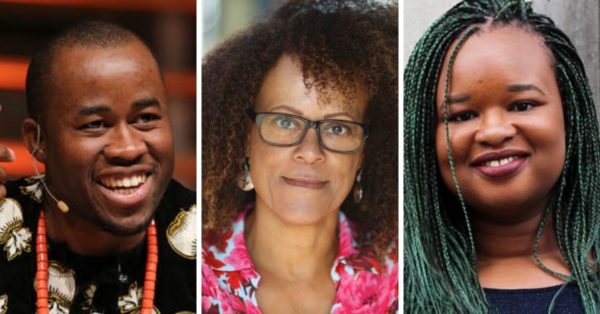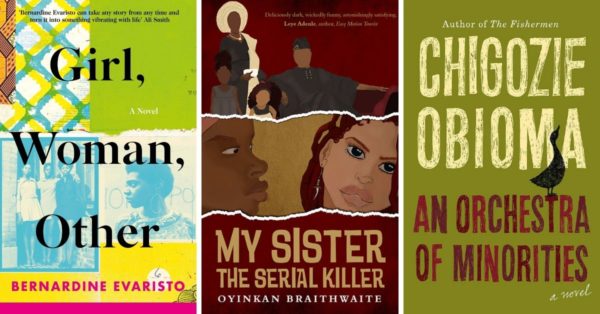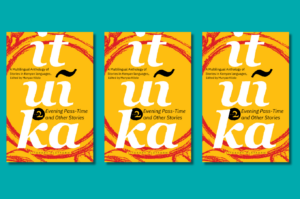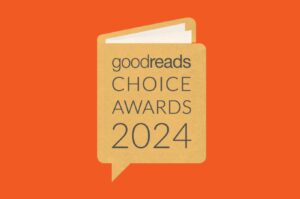
The 2019 Booker Prize longlist was announced hours ago, and on it are Bernardine Evaristo for her eighth book Girl, Woman, Other, Chigozie Obioma for his second novel An Orchestra of Minorities, and Oyinkan Braithwaite for her Women’s Prize-shortlisted debut My Sister, the Serial Killer, which, at 31, makes her the youngest candidate for the £50,000 prize this year. All three are Nigerian, with Evaristo also British. This is the first nomination for Evaristo, and the second for Obioma, following his 2015 shortlisted debut The Fishermen. Alongside them on the 13-strong list are two former winners in Margaret Atwood, for her The Handmaid’s Tale sequel The Testaments, and Salman Rushdie for his Quichotte; as well as the Turkish novelist Elif Shafak, for her 10 Minutes 38 Seconds in This Strange World, and the Irish writer Kevin Barry, for his Night Boat to Tangier.
Evaristo’s Girl, Woman, Other was released on 2 May 2019 by Penguin Random House imprint Hamish Hamilton. The Brunel University creative writing professor, a dynamic visionary best known in the African literary scene as the founder of the Brunel International African Poetry Prize, the continent’s most influential poetry institution, is in fact a prolific writer of fiction, her oeuvre including the experimental novels The Emperor’s Babe (2001), Soul Tourists (2005), and Lara (2009), the novella Hello Mum (2010), the formal novels Blonde Roots (2008) and Mr Loverman (2013), and the poetry collection Island of Abraham (1994). Girl, Woman, Other was hailed by Elle as “a choral love song to black womanhood in modern Great Britain.” Here is a description by its publishers:
Teeming with life and crackling with energy – a love song to modern Britain, to black womanhood, to the ever-changing heart of London.
Girl, Woman, Other follows the lives and struggles of twelve very different characters. Mostly women, black and British, they tell the stories of their families, friends and lovers, across the country and through the years.
Joyfully polyphonic and vibrantly contemporary, this is a gloriously new kind of history, a novel of our times: celebratory, ever-dynamic and utterly irresistible.
Read our coverage of the book here.

Braithwaite’s My Sister, the Serial Killer was released in the UK on 20 November 2018 by Penguin Random House imprint Doubleday and in Nigeria in December 2018 by Narrative Landscape Press. Already optioned for a TV series by the UK company Working Title, we ran four excerpts from it. Here is a description by its publishers:
Korede is bitter. How could she not be? Her sister, Ayoola, is many things: the favorite child, the beautiful one, possibly sociopathic. And now Ayoola’s third boyfriend in a row is dead.
Korede’s practicality is the sisters’ saving grace. She knows the best solutions for cleaning blood, the trunk of her car is big enough for a body, and she keeps Ayoola from posting pictures of her dinner to Instagram when she should be mourning her “missing” boyfriend. Not that she gets any credit.
Korede has long been in love with a kind, handsome doctor at the hospital where she works. She dreams of the day when he will realize that she’s exactly what he needs. But when he asks Korede for Ayoola’s phone number, she must reckon with what her sister has become and how far she’s willing to go to protect her.
Sharp as nails and full of deadpan wit, Oyinkan Braithwaite’s deliciously deadly debut is as fun as it is frightening.
Obioma’s An Orchestra of Minorities was released on 8 January 2019 by Little, Brown. We covered the novel’s public life since its May 2017 acquisition by its publisher. Read the first chapter. Here is a description:
Set on the outskirts of Umuahia, Nigeria and narrated by a chi, or guardian spirit, AN ORCHESTRA OF MINORITIES tells the story of Chinonso, a young poultry farmer whose soul is ignited when he sees a woman attempting to jump from a highway bridge. Horrified by her recklessness, Chinonso joins her on the roadside and hurls two of his prized chickens into the water below to express the severity of such a fall. The woman, Ndali, is stopped her in her tracks.
Bonded by this night on the bridge, Chinonso and Ndali fall in love. But Ndali is from a wealthy family and struggles to imagine a future near a chicken coop. When her family objects to the union because he is uneducated, Chinonso sells most of his possessions to attend a college in Cyprus. But when he arrives he discovers there is no place at the school for him, and that he has been utterly duped by the young Nigerian who has made the arrangements.. Penniless, homeless, and furious at a world which continues to relegate him to the sidelines, Chinonso gets further away from his dream, from Ndali and the farm he called home.
Spanning continents, traversing the earth and cosmic spaces, and told by a narrator who has lived for hundreds of years, the novel is a contemporary twist of Homer’s Odyssey. Written in the mythic style of the Igbo literary tradition, Chigozie Obioma weaves a heart-wrenching epic about destiny and determination.
Here is the full longlist:
- Frankissstein, Jeanette Winterson
- The Wall, John Lanchester
- Girl, Woman, Other, Bernadine Evaristo
- Lanny, Max Porter
- The Man Who Saw Everything, Deborah Levy
- The Testaments, Margaret Atwood
- Ducks, Newburyport, Lucy Ellmann
- An Orchestra of Minorities, Chigozie Obioma
- 10 Minutes 38 Seconds in This Strange World, Elif Shafak
- Night Boat to Tangier, Kevin Barry
- Lost Children Archive, Valeria Luiselli
- My Sister, the Serial Killer, Oyinkan Braithwaite
- Quichotte, Salman Rushdie
The 13 novels were selected from 151 submissions. The judging panel comprises the former publisher and editor Liz Calder, the novelist Xiaolu Guo, the musician Joanna MacGregor, the writer Afua Hirsch, and Hay Festival director Peter Florence, who chairs it.
“There are no favorites; they are all credible winners,” they said of their selections. “They imagine our world, familiar from news-cycle disaster and grievance, with wild humour, deep insight and a keen humanity. These writers offer joy and hope. They celebrate the rich complexity of English as a global language. They are exacting, enlightening and entertaining.”
The Booker Prize Foundation literary director Gaby Wood stated that, in line with the judges’ power to consider books that originally hadn’t been submitted, they called in Young Adult novels and “books that are sometimes dismissed as ‘commercial.’” The longlist “shows the incredible range of what’s being written today. There are familiar names here writing at the height of their powers, there are young writers of exceptional imagination and daring, there is wit, incisive political thought, stillness and thrill. And there is a plurality that shows the making of literature in English to be a global endeavour.”
With the Man Group having ended its sponsorship, the prize has dropped “Man” from its name and has reverted to The Booker Prize, and is this year supported by Crankstart, a charitable foundation owned by Michael Moritz and Harriet Heyman.
The prize’s 2018 winner Anna Burns saw sales for her Milkman skyrocket from 963 in the week before the announcement to 9,446 in the week after, and then to 18,786 in the week following. At the moment, the novel has sold 546,500 copies in all formats and been translated into 40 languages.
The shortlist will be out on 3 September and the winner announced on 14 October at a ceremony in London.
Brittle Paper congratulates Bernardine Evaristo, Chigozie Obioma, and Oyinkan Braithwaite.









COMMENTS -
Reader Interactions